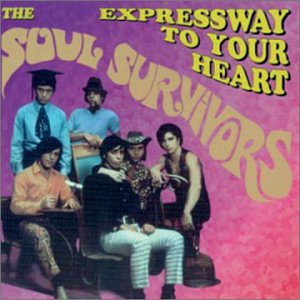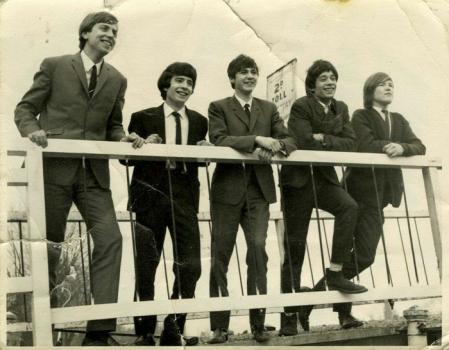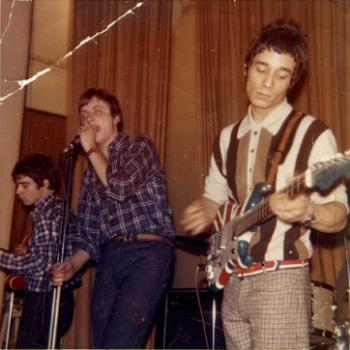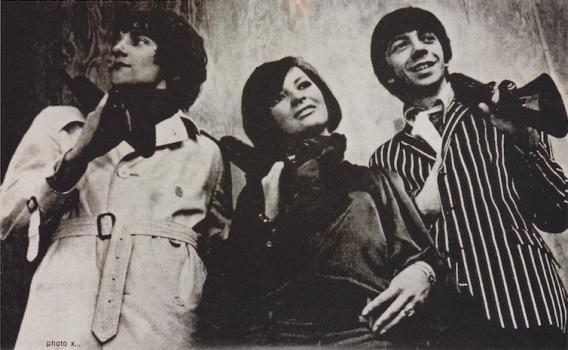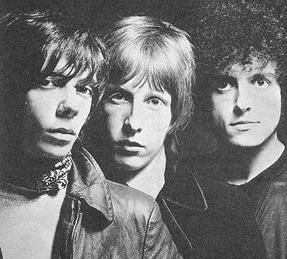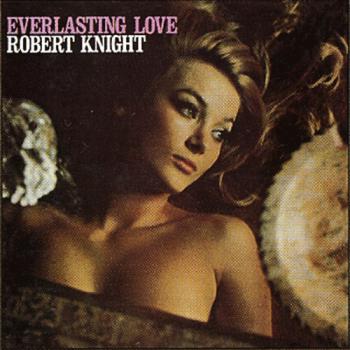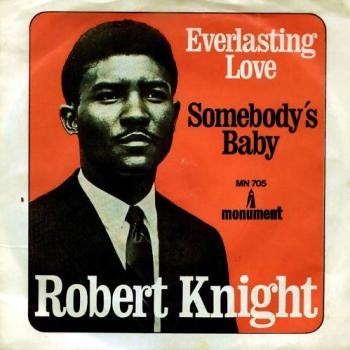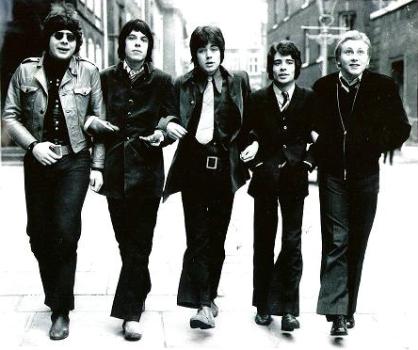The Soul Survivors
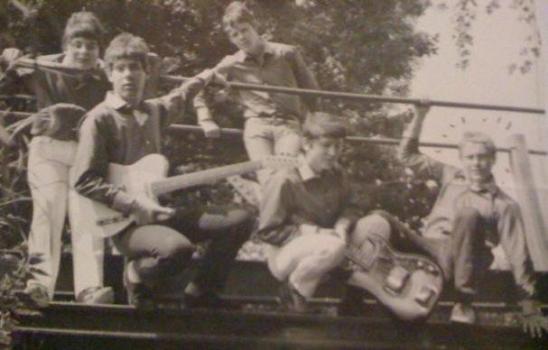 (February 1966 - August 1966)
(February 1966 - August 1966)
from left:
Maurice Bacon - drums
Ian Miller - guitar
Morgan Fisher - keyboards
Warwick Rose - bass
Steve Ellis - vocals
The Love Affair started out as the Soul Survivors in early 1966, featuring Steve Ellis (vocals), Maurice 'Mo' Bacon (drums), Stephen Morgan Fisher (keyboards), Ian Miller (guitar), and Warwick Rose (bass).
They were managed by Maurice's father, Sidney Bacon. Sid was a drummer, too, and his brother Max was a famous jazz drummer from the 30s and 40s - so when Maurice started playing drums, Sid formed a band for his son by placing adverts in Melody Maker, and held auditions in his Walthamstow warehouse. Maurice Bacon: "I come from a family of drummers. Uncle Max was a famous drummer in the Ambrose Orchestra in the 30s. My father was a semi-pro drummer, and a cousin, Victor Feldman, was a famous session player. He played on Steely Dan's records. So after I started playing drums, my father formed a band for me by placing adverts in the paper."
The Bacons were from Southgate; the rest of the band were recruited from nearby Finchley, where Maurice's father Sidney was the proprietor of a successful handbag factory. Steve Ellis: "There was an ad in the Melody Maker for a singer for a young band. As a dare, I went for this audition. And that was the Soul Survivors: Maurice, myself, Morgan Fisher on keyboards - I knew Morgan already, we used to spend evenings together listening to soul music - Ian Miller on guitar and Warwick Rose on bass. This is early 1966. The first number I ever learnt to sing with the band was 'Keep On Running'." Prior to joining, Morgan Fisher played with two high school bands, The Private Eyes and The Beat Circuit. The vocalist with both was Chris Ross - who went on to sing for the Glyndebourne Opera Company.
Bacon: "My father was fairly wealthy. He invested a lot in the band, bought all the equipment and had a warehouse in Walthamstow in which we'd rehearse. And we had vans to go to gigs in." Fisher: "The Soul Survivors were a good soul band. We were really hip and into the Stax label, and jazz - Jimmy Smith and stuff, and that's the kind of music we played, really. We had all these obscure records - the Sue label was another fantastic one, Billy Preston and stuff like that and we used to do really good soul music". Soul music was very popular in England in 1966/67, and the Soul Survivors were in at the beginning, even getting a residency at the Marquee Club in London.
In the summer of 1966 the Love Affair saw the first of many personnel changes: Georgie Michael and Michael 'Mick' Jackson replaced Ian Miller and Warwick Rose, respectively. Warwick now sells medical insurance in Los Angeles. Michael Jackson had moved down to London looking for a gig - and successfully auditioned for the band. Michael Jackson: "I met Ollie Halsall and Mike Patto (of Timebox-fame) at Butlin's Summer Camp in Filey. They invited me to stay with them in London. I didn't stay long - I spotted an advertisement in the Melody Maker. A London based band were looking for a bassist, so I auditioned and got the job. This was the Love Affair - they were still called the Soul Survivors then."
The Love Affair Mk 1.1
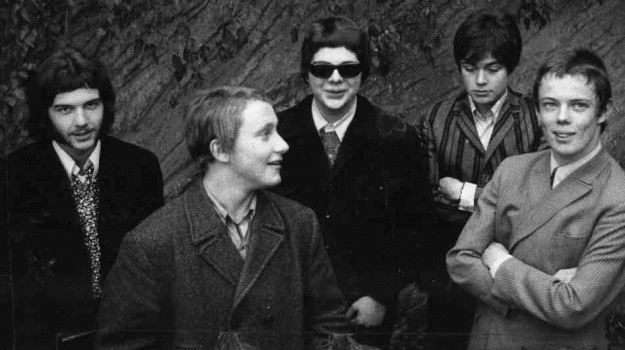 (August 1966 - July 1967)
(August 1966 - July 1967)
from left:
Georgie Michael - guitar
Steve Ellis - vocals
Maurice Bacon - drums
Mick Jackson - bass
Morgan Fisher - keyboards
In August 1966 the band signed a record contract with Decca Records, who came to rehearsals and said they loved the band.
Sid Bacon hooked up with Decca's marketing director, John Cokell and the label's in-house photographer David Wedgbury, who eventually became co-managers. Around this time the band changed their name to the Love Affair. Fisher: "We were doing great - but our manager said 'let us have a hit', he wanted us to become more pop. We changed our name to The Love Affair because there was already an American band called The Soul Survivors. They had a big hit record with "Expressway To Your Heart. Love Affair came from the name of a TV series at the time." The band's management had wanted to call the band Thin Red Line. Ellis: "I was happy with the Soul Survivors. There was talk of calling us Thin Red Line, the idea being to have a painted line down the middle of our heads that went down into the suit and trousers! Honestly! This was quite radical, almost like Clockwork Orange, but we went, no way, we're not 'avin' that!"
The Love Affair went into Abbey Road Studios for their first recording for Decca in November 1966. Bacon: "We'd done demos in little studios in Denmark Street but the first time we went in a proper recording studio was with Kenny Lynch. He wrote the Small Faces' hit, 'Sha La La La Lee' - he was this credible songwriter and the Small Faces were our idols. He came up with 'Woman Woman', which we recorded in Abbey Road in November 1966." The song would remain unreleased until year 2000 (Angel Air CD "No Strings).
Next, the Love Affair hooked up with the now legendary producer Mike Vernon, who was working in-house at Decca at the time. They did a cover of the Rolling Stones' "She Smiled Sweetly", perhaps inspired by Chris Farlowe's success with Jagger/Richards "Out Of Time" earlier in the year. The single was issued within days of the Stones' own version on their "Between The Buttons" album in in February 1967, coupled with "Satisfaction Guaranteed", a Fisher/Ellis original.
When "Satisfaction Guaranteed" failed to chart, Cokell and Wedgbury, now acting in a management capacity, submitted many songs to the band, one of which was a track by Davy Jones (David Bowie) called "Cobbled Streets and Baggy Trousers". Another was "A Whiter Shade Of Pale". The two numbers were rehearsed but neither song was recorded.
Ellis: "I knew 'Satisfaction Guaranteed' wouldn't be a hit. I wasn't into the Stones, anyway, so it was a bad decision. But we were kids. Then our management came in with 'A Whiter Shade Of Pale' by Procol Harum, touting it about, but there was no way we could better that. It was fabulous. So we passed on that one. It wasn't really us - it was too hippie. Additionally Love Affair were soul-orientated and the band preferred 'Everlasting Love', which turned up in exactly the same way as 'A Whiter Shade of Pale'.""
By the time "She Smiled Sweetly" was in the shops - and despite their youth - the band had made their presence felt in clubland. Ellis: "We'd rehearse and rehearse, play and play. We did all the London soul clubs - the Marquee, Tiles, the Flamingo, the Kilt and the Ricky Tic. We were mad on Stax, Motown, Chess, a bit of Beach Boys." Adds Bacon: "At that point, we were fairly cool. We played at the Speakeasy, the Bag O'Nails. We'd play residencies - every Saturday at the Marquee for a month. We played three/four nights a week around the country to make a living - even though, initially, we were still at school. We had left school and gone professional for nearly a year, gigging, before we started having hits."
The band's set was typical of live bands of the period, hooked on the same U.S. soul 45s beloved of their Mod-heavy audience - songs like Aaron Neville's "Tell It Like It Is", Garnett Mimms' "I'll Take Good Care Of You", "Rescue Me" by Fontella Bass, Lee Dorsey's "Ride Your Pony", Eddie Floyd's "Knock On Wood" and Marvin Gaye's "Ain't That Peculiar". Ellis: "My favourite singers were Sam & Dave, Wilson Pickett, Ray Charles, the Impressions, most definitely Otis Redding. I love David Ruffin's voice - beautiful - and James Brown's."
But their chief role model was undoubtedly the Small Faces. Ellis: "they were kindred spirits - them and the Who. The Marriott/Lane partnership was superb. Those two bands were four/five years older than us. The Move were something else, too. On a good night at the Marquee, they were phenomenal - they were more West Coast pop, Byrds covers. We'd see Georgie Fame, brilliant, a major talent; Zoot Money, Graham Bond, Geno Washington, Cliff Bennett, Eric Burdon."
The Love Affair Mk 1.2
 (March 1967 - August 1967)
(March 1967 - August 1967)
from left:
Rex Brayley - guitar
Maurice Bacon - drums
Steve Ellis - vocals
Mick Jackson - bass
Morgan Fisher - keyboards
Decca eventually dropped the band when "She Smiled Sweetly" didn't chart, but this was just a minor obstacle on the road to success. In the spring of 1967 the Love Affair visited R.G. Jones' studios in Morden, South London to cut some demos.
By then Rex Brayley had replaced Georgie Michael on guitar. Rex had previously been in a Hounslow, London based band called 'The Dae-b-Four' with his brother Brian (see separate write-up in the right column).
Bacon: "We did a lot with R.G. Jones. He was great. I've still got an acetate on Oak from May 1967, 'Do You Dream', written by Steve and Morgan."
"Do You Dream" was finally released in 2000, on the Love Affair compilation "No Strings" issued by Angel Air. The CD also included the 1966 recording of "Woman Woman", plus both sides of the "She Smiled Sweetly" single.
The Love Affair Mk 1.3
(August 1967 - September 1967)
Rex Brayley - guitar
Maurice Bacon - drums
Steve Ellis - vocals
Mick Jackson - bass
Peter Bardens - keyboards
In the summer of 1967 Morgan Fisher left the band to go to college, he was still only 17! Morgan: "I joined the band when I was still at school, and then various people convinced me I ought to stay at school to finish my 'A' Levels. So I left them for about six months, during which time they had a number one hit. I had no plan to come back, but after they had a number one hit I asked to come back and they were quite happy to have me back!"
Morgan was initially replaced by Peter Bardens (see separate write-up in the right column), but he only stayed for a few months, and would eventually form Camel. With Lynton Guest the band found a permanent replacement. Lynton: "I answered an advert for a keyboard player in the coolest music mag of the day, Melody Maker. I was 16 and decided to go to London from my home in Leicester for the audition. That was it for me, there was no way I was going back home even if I didn't get the job. As it happened, despite the fact that there were about 50 keyboard players at the audition, I got the job."
The Love Affair Mk 1.4
 (September 1967 - August 1968)
(September 1967 - August 1968)
from left:
Lynton Guest - keyboards
Maurice Bacon - drums
Rex Brayley - guitar
Mick Jackson - bass
Steve Ellis - vocals
Island A&R Muff Winwood, older brother of Stevie Winwood, then late of the Spencer Davis Group, took a liking in the band and booked studio time at Island. Bacon: "We were sending out demos and Muff Winwood picked up on us because of Steve's voice, which was incredible."
With Muff producing, the Love Affair recorded the Spencer Davis Group's "Back Into My Life Again" at Island. Bacon: "Steve Ellis was very much in the Steve Winwood vein so Muff would have appreciated that." EMIdisc acetates were cut but despite the song's obvious commercial potential, the track was abandoned. Meanwhile, the lads stumbled across another potential cover version. Bacon: "because John Cokell was at Decca, he heard Robert Knight's 'Everlasting Love', which was on their subsidiary label, Monument." Ellis: "The management put it on and we all loved it immediately. Muff wanted us to record it on our own - no orchestra, no nothing. Somewhere, there's a version just by the Love Affair."
Knight had enjoyed considerable Stateside success with "Everlasting Love" and Cokell knew that'd have to be quick to steal a march on its UK release. There was one problem with the Muff Winwood-produced version: as Maurice puts it, "no-one thought it was that good". Back to the drawing board. By this time, the Love Affair had joined the books of the prestigious Starlight Agency for live bookings, alongside CBS artists like the Tremeloes, Anita Harris, and the Marmalade. That led them in turn to CBS's in-house producer Mike Smith, famous - alongside 'musical director' Keith Mansfield - for a polished, orchestrated, hard-hitting pop sound.
Bacon: "It was probably John Cokell's idea to do 'Everlasting Love' with an orchestra. None of us could read music and all these singles were made within three-hour sessions." It was decided that Steve should sing but the backing - orchestra and all - would be played by session musicians. Ellis: "Mike Smith was brilliant, so talented. They had a 40-piece orchestra and you'd be in the back door at CBS Studios - bosh and you're on, three takes and that was that. I put the vocal on and the number was a bit special so everything just clicked. Obviously I felt odd without the band being in the studio but it was for the good of all involved. Two takes - done. The band were not too concerned about this approach to things, and it was hardly unheard of at the time for session men to replace a band on record, although we were probably too honest for our own good when we owned up to it."
Issued in December 1967, the Love Affair's "Everlasting Love" was a barnstomper of a single. Ellis: "It was trying to be like Phil Spector, that massive, orchestrated wall of sound. When I heard it, it completely knocked me back. I'd never heard anything like it".
The following week, "Everlasting Love" climbed to no. 15, then no. 3 and no. 2 before topping the charts on 3rd February. The Love Affair had arrived and yet the band were barely out of short trousers. Bacon: "From starting the band to recording 'Everlasting Love' was less than two years. I was 16 the week it went to no. 1. We did Top Of The Pops five weeks in a row - three as it was going up the charts and then it was no. 1 for two."
The practice of using session musicians on a pop record was commonplace but rarely acknowledged - that is, until the Love Affair appeared live on prime time TV. Bacon: "We were on Jonathan King's show, Good Evening. He likes notoriety so he says to our bass player on live TV on a Saturday night, 'You didn't play on your record'. We looked at each other: 'No, we didn't'. He said 'But you did sing on it, didn't you?' 'Yeah.' The next thing, it's all over the papers: 'Band admit...'. So we got blacklisted from Top Of The Pops. One of the executives used to say, if you want to be on the programme, you have to buy my wife a washing machine as a token gesture of goodwill. We said, bollocks, no! We're in the charts, anyway. We refused so we got banned. There was loads of fuss but we were cocky and 17/18 so we didn't care - as long as we were playing to a good crowd."
Sticking with the hit formula, the management had the band covering another Robert Knight song also written by Cason/Gayden, "Rainbow Valley". Cynical or not, the gambit paid off and the Love Affair were rewarded with a second Top 5 hit in April. Again, the orchestrated Mansfield/Smith arrangements and Ellis's powerful vocals shone through, but the record led to accusations of plagiarism. Meanwhile, a keen business eye led to a sponsorship deal with a famous cosmetics company. Bacon: "We were one of the first bands to do a sponsored tour - with Yardley make-up. We did all the big Top Rank clubs and Yardley put their 'Pretty Goods' range in the foyers. I've got a ten-minute video that Yardley did of us. On the back of the cover of 'Rainbow Valley', girls could send off for a Yardley pack. We got paid a fortune, about £400 a show. I think the only act earning more money was Geno Washington & the Ram Jam Band."
Lacking any real confidence as tunesmiths, the band advertised for budding songwriters, which led them to Phillip Goodhand-Tait. His first contribution had been the B-side of "Everlasting Love", "Gone Are The Songs Of Yesterday", though its recording emphasised the hurried, production-line attitudes of the times. Bacon: "It was done at the end of a session, and we only had time left for one take. Steve missed the first verse and they didn't even bother going back to do it again!" Steve Ellis would later cut Italian language versions of both "Everlasting Love" and "Rainbow Valley".
The Love Affair Mk 1.5
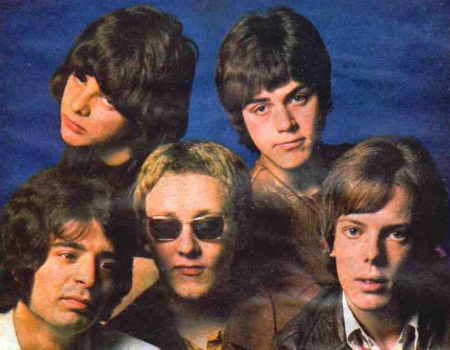 (August 1968 - December 1969)
(August 1968 - December 1969)
from left:
Rex Brayley - guitar
Maurice Bacon - drums
Steve Ellis - vocals
Mick Jackson - bass
Morgan Fisher - keyboards
Morgan Fisher rejoined the group in the summer having having finished the Sixth Form exams, much to Lynton Guest's displeasure. Around this time John Cokell left Decca to oversee the band's day-to-day affairs. Guest later formed English Rose, who recorded for Polydor and appeared in the pop culture exploitation movie, Groupie Girl.
Ellis: "Phillip Goodhand-Tait was the singer/keyboard player in The Stormsville Shakers, an early '60s soul band. He was class. Anyway, we got chatting after a gig he did in London and he started shooting songs at us. After a few tapes, we thought, this is good - so he wrote our next four singles, 'A Day Without Love', 'One Road', 'Bringing On Back The Good Times' and 'Baby I Know', plus album tracks. He was a good singer and keyboard player, kinda like a sixth member - though he didn't tour. It wasn't just like a conveyer belt."
Each single was heavily orchestrated, each sported Steve's soulful voice and all but the last of Goodhand-Tait's compositions kept the Love Affair in the Top 20 through till the summer of '69. It was a winning formula, albeit frustrating for the other band members. Bacon: "We didn't play on any of the singles. We'd only have three hours so the easiest, most efficient way was for Keith Mansfield to score the whole thing, bring in session guys like Clem Cattini on drums and Herbie Flowers on bass and do it in two takes. Mansfield was only involved with the singles, when we used orchestras. Otherwise, it was John Goodison. We were allowed to play on the B-sides and the album and write some of the tracks for the LP. We did the LP in bits and pieces at CBS's studio just behind Oxford Street. You had a day to record two numbers - on eight-track, everything was done pretty much live."
The third single "A Day Without Love" was released in September. It eached #6 in the UK, no doubt helped by the bands frantic touring and many TV appearances, including Top Of The Pops and Beat Club. Ellis: "We played with Status Quo - good lads - and Terry Reid, who was brilliant and a nice fella, too. We became pals on a package tour - Gene Pitney, the Paper Dolls and the Ronnie Scott Band. We were touring constantly, flat out. It'd be, like, where the hell are we? We did a fantastic tour with Geno Washington and Amen Corner." "We did a big show in Paisley with them", adds Maurice. "As we were going on, they were still shouting, 'Geno, Geno!' We did gigs with the Marmalade, the Tremeloes, Chicken Shack. We did a Scott Walker package tour - with Gun and Terry Reid - and another with Herman's Hermits. We also headlined a tour, supported by Dave Berry. We even went to Germany and did that Beat Club programme in Bremen."
Their debut album "Everlasting Love Affair" was released in December to cash in on the success of "A Day Without Love", but it wasn't promoted and failed to chart. It was a solid enough collection, however. Ellis: "I truly don’t know what happened. There was no big album campaign, and just hardcore supporters bought it. Shame, as in retrospect the live studio tracks like 'Hush' captured what we were about without the orchestra. Love Affair were a kicking band, but we were labelled 'teenybop idols', and it just stopped people taking us a bit more seriously. Very disheartening for me and the band at the time." Still, the band were undoubtedly at the top of their career, as you couldn't open a music magazine without finding one or more stories about the band inside. The "Everlasting Love Affair" album included the the first three CBS singles plus accomplished and memorable versions of "Hush" (Deep Purple), "The First Cut Is The Deepest" (Cat Stevens/P.P. Arnold), "Tobacco Road" (the Nashville Teens), Mike D'Abo's "Handbags And Gladrags" and a slow, rocked-up take on the Hayes/Porter soul favourite, "60 Minutes (Of Your Love)". A clutch of original songs (Ellis/Fisher's summer pop ditties, "Could I Be Dreaming" and "The Tree", and Mick Jackson's "Once Upon A Season") ended with a Small Faces-styled cockney knees-up, "Tale Of Two Bitters", on the 'joanna'. Interestingly, the single B-sides were all left off the album, and other left over tracks included covers of "You've Lost That Loving Feeling" and "Gimme Some Loving", plus "Sad Song". The Love Affair made a 30-minute promotional film in November 1968 which included their three hit singles. Sadly, this film has since been lost, along with television footage from the groups promotion trips to Holland, Belgium, Germany, Austria and Italy.
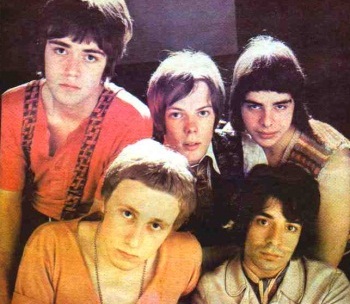 Opting for a more mature sound, they cut a fourth CBS single, "One Road", a powerful ballad that sported a stringy backing instead of the familiar brass section. It reached #16 in March 1969, showing public reaction to their new sound was not favourable - although the press was quite supportive for a change. "Bringing On Back The Good Times" gave the band their final Top 10 hit (#10 in July 1969) and "Baby I Know" followed in October, but it didn't chart.
Opting for a more mature sound, they cut a fourth CBS single, "One Road", a powerful ballad that sported a stringy backing instead of the familiar brass section. It reached #16 in March 1969, showing public reaction to their new sound was not favourable - although the press was quite supportive for a change. "Bringing On Back The Good Times" gave the band their final Top 10 hit (#10 in July 1969) and "Baby I Know" followed in October, but it didn't chart.
Morgan Fisher, Maurice Bacon and Mick Jackson also found time to produce an album for Deram artists Igginbottom in 1969. The album was entitled "Igginbottom's Wrench" and Alan Holdsworth, now a legendary fusion guitarist, was one of two guitarists in Igginbottom.
In December, Steve Ellis split in pursuit of a solo career, but the band soldiered on with a new vocalist.
Ellis: "People thought we were manufactured, like the Monkees. That's bullshit. We were a gigging, functioning, up-and-running band. We got a lot of unfair flack. Morgan was a really good keyboard player and we were a tight little unit. But when it kicked into teenybop, you couldn't hear anything - ask Andy out of Amen Corner, the Small Faces, the Herd. It didn't matter what you played. It was just noise, complete chaos. You'd have to back a car up to get in the venue - and straight out. It was dangerous. Kids used to pull chunks off your hair."
By summer 1969, the cracks were showing. Bacon: "We were very obnoxious (laughs). The excesses affected different people in different ways. I've never taken drugs because my father was into health foods and yoga. But drink and drugs did come into the equation, which affected some more than others. Basically, the whole thing went pear-shaped."
That December, Steve Ellis announced his departure, live onstage at the Mayfair Ballroom, Newcastle. Why? Ellis: "Let's just say unfair distribution of funds. I was doing most of the recording and interviews. The stage show was mad. It was so physically demanding, like James Brown - double dynamite. I really went for it. At the Tottenham Royal, I'd swing on the curtains, across the chandeliers - anything went to make a good show. As you get older, you wise up. Towards the end, I thought, we're getting totally roasted here. It doesn't feel right. They said stay on, we'll give you X amount. No, I said, you're robbing us, I don't want to work with you. I always had an affinity with Morgan but I wanted to get into singing more. During gigs, you couldn't hear what you were singing. You weren't getting any musical payback. It was like Beatlemania. So I thought, I've got to walk."
Maurice remembers it differently: "Afterwards, CBS offered Steve a big deal to stay on the label as a solo artist - I think they gave him ten grand. That's why he stayed on CBS. Steve was getting fidgety. It was always him and us - well, Steve was a bit out there and some of the excesses were setting in. It was weird. We were all getting fed up with it and there was a bit of bad blood. The problem was, we started as a credible band and then became this sort of joke - with the stigma of not playing on the singles. Things were changing, too. We played with the Episode Six, a pop harmony band like the Beach Boys, and suddenly they were Deep Purple (laughs) and we wanted that same credibility. Steve did as well. Singers always get affected more. I can hide behind a drum kit but the vocalist is, like, naked out front and takes everything personally - good or bad - because they're the front person."
Bacon: "We had a big meeting in my father's warehouse one day. Steve said, I'm going, I'm fed up with all this. And none of us were really upset. We breathed a sigh of relief, although we knew it was pretty disastrous. So Steve left, with our manager John Cokell. And we were still only on £35 a week - when the average wage was about £25."
 (February 1966 - August 1966)
(February 1966 - August 1966)





